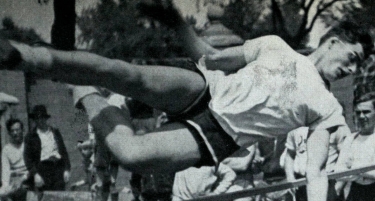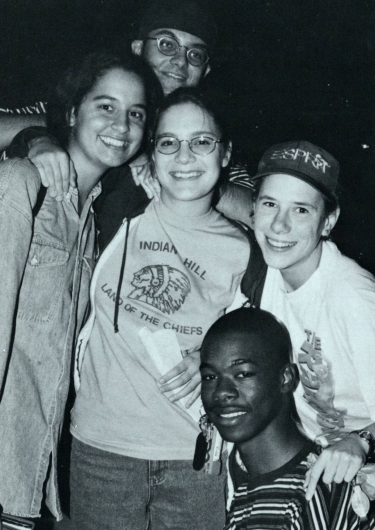As spring arrives and the school year draws to a close, many students will be anticipating FEST, DePaul's annual spring celebration. Though FEST has been around for more than 30 years, it is not the only spring festival found in the university's history. Past students have celebrated spring and the end of the school year consistently, albeit in a variety of ways. Although the events and the venues may change, each celebration's focus on bringing DePaul students together remains the same.
 A student competes in Field Day activities in 1936. (DePaul University/Special Collections and Archives)
A student competes in Field Day activities in 1936. (DePaul University/Special Collections and Archives)One of the earliest spring celebrations was Field Day, celebrated from 1929 into the late 1930s. Unlike other spring celebrations that followed, Field Day focused on sports and was the last hurrah of DePaul's extensive intramural program. Usually held in late May or early June, Field Day was originally called Circus Day and was hosted by The Wranglers, an all-male student activity group. Every Field Day featured track and field events, though other sports events were often added. "The DePaulia's" descriptions of Field Day over the years included softball games, horseshoe throwing, tennis matches and tug-of-war contests.
As many of DePaul's intramural teams were formed according to fraternity and sorority affiliations, early iterations of the celebration had a large Greek emphasis and included parades featuring floats made by the university's Greek organizations. A dance also accompanied Field Day, at which awards for the day's events would be given out. Though this description may seem to imply that Field Day was only meant for those who participated in intramurals or Greek life, it was advertised as an event for the entire community. "The DePaulia" noted, "The plans for Field Day are arranged to make the entire day one of joy to all and one which will not be forgotten for a long time."
The most obvious precursors to FEST are People's Day, which ran from 1971 until the early 1980s, and the All-Nighter, which ran from 1976 to 1982. Information regarding People's Day is scarce, but a 1979 issue of "The DePaulia" explains, "Started as a protest against Viet Nam, People's Day is still sponsored by Program Council the former name of the DePaul Activities Board to commemorate the first People's Day and to celebrate spring." Though it began as a war protest, People's Day quickly became a typical spring festival, featuring music performances, a dunking booth, barbecue, basketball games, and dance marathons.
 Students celebrate at FEST in 1997. (DePaul University/Special Collections and Archives)
Students celebrate at FEST in 1997. (DePaul University/Special Collections and Archives)
The All-Nighter, meanwhile, was a slightly different type of spring festival. Not only did the celebration take place overnight, but it also was held indoors. As with People's Day, details regarding the All-Nighter are hard to find, but it seems to have been an overnight event including a variety of activities. Differing from year to year, these activities included music performances, comedy troupes, film showings, dancing, table game tournaments and palm readings. Both events occurred simultaneously for several years and focused on bringing the university community together. Each also seem to lead, both time- and content-wise, into today's FEST.
FEST began in 1985 and was originally known as Blues Fest, with the name changing to Fest in 1992 - it seems to have been written as Fest and FEST interchangeably until 2001, at which point the standard became FEST. Early iterations featured performances by only blues and jazz musicians, a stipulation that changed along with the name. Earlier FEST celebrations also featured booths for various student organizations and a range of other activities, with the 1993 Fest notably boasting an aerotrim, the large gyroscope that astronauts use for training. Today, FEST has become primarily a music festival, a shift which has further helped make it a permanent fixture among university traditions.
Throughout DePaul's history, students have looked forward to and celebrated spring festivals to help decompress after a long academic year. But for DePaul students, these festivals are much more than just a way to blow off steam. As "The DePaulia" said of FEST in 1998, "It is more than just a simple event, party, or concert. It doesn't even matter what band is playing, or what the mythical element is that brings all the students together. All that matters is that for one day the student body comes together and enjoys themselves."
In the end, the value of DePaul's spring festivals is not the festivals themselves, but the community who partakes in them.